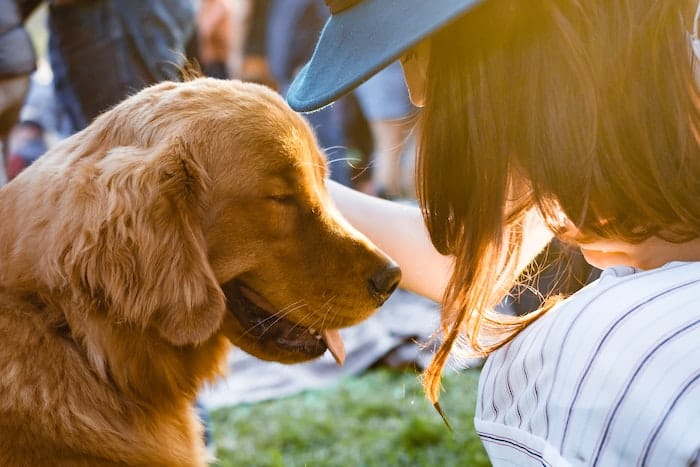If you live in Houston, plan to visit or are looking to relocate to the city, here is some helpful information that might be beneficial to all of you dog owners.
Do you need to register your dog with the city of Houston?
According to the city’s animal ordinance, all dogs over the age of three months must be registered with the City of Houston within 30 days of being acquired or moving within the city limits. The registration fee is $13 for spayed or neutered dogs, and $70 for unaltered dogs. Proof of current rabies vaccination is required at the time of registration. Failure to register your dog can result in a citation and a fine.

What businesses in Houston allow dogs inside?
Many businesses in Houston allow dogs inside, especially those that cater to pet owners. Here are some examples of businesses in Houston that are dog-friendly:
- Petco: Petco is a national pet supply store that welcomes dogs inside its Houston locations.
- Half Price Books: This popular book chain allows well-behaved dogs inside their stores.
- Houston Arboretum & Nature Center: This outdoor nature center allows leashed dogs on its trails and in its outdoor areas.
- Axelrad Beer Garden: This popular Houston beer garden welcomes dogs in its outdoor seating area.
- Urban Harvest Farmers Market: This popular farmers market welcomes dogs on leashes and even provides water bowls for them.
- Barnaby’s Cafe: This Houston restaurant chain has dog-friendly outdoor seating areas.
- Bayou City Adventures: This outdoor adventure company allows dogs on its kayak and paddleboard rentals.
It’s always best to check with the business before bringing your dog inside, as policies and restrictions may vary.
How many dog parks does Houston have?
Houston has over 20 designated dog parks where dogs can run, play, and socialize off-leash. These parks are spread throughout the city and offer a variety of amenities for both dogs and their owners.
Here are some of the most popular dog parks in Houston:
- Johnny Steele Dog Park is a popular dog park is located in downtown Houston and features separate areas for small and large dogs, a pond for swimming, and a shaded area for owners.
- Discovery Green Dog Park, located in the heart of downtown, has separate areas for small and large dogs, agility equipment, and plenty of shade.
- Maxey Park Dog Park is a large dog park is located in east Houston that features separate areas for small and large dogs, a pond for swimming, and agility equipment.
- Congressman Bill Archer Bark Park is located in west Houston and offers separate areas for small and large dogs, a walking trail, and a pond for swimming.
- Tanglewood Dog Park in the Tanglewood neighborhood, this park offers separate areas for small and large dogs, benches, and plenty of shade.
- Danny Jackson Dog Park is located in the Greenway/Upper Kirby area and features separate areas for small and large dogs, agility equipment, and water fountains.
These are just a few examples of the many dog parks available in Houston. Each park has its own set of rules and regulations, so it’s important to check the park’s website or signage before visiting.
What are the city rules of a dog park in Houston?
The city of Houston has established rules and regulations for its designated dog parks to ensure the safety and enjoyment of all park visitors.
Here are some of the most important rules to keep in mind when visiting a Houston dog park:
- Dogs must be leashed when entering and exiting the dog park.
- Owners must have a leash in their possession at all times and use it when necessary.
- Dogs must be vaccinated, licensed, and wearing a collar with identification tags.
- Owners are responsible for picking up after their dogs and disposing of waste in designated trash cans.
- Aggressive dogs are not permitted in the park, and owners are responsible for controlling their dogs’ behavior.
- Dogs in heat are not permitted in the park.
- Children under the age of 12 must be accompanied by an adult.
- Food is not permitted in the park, and owners should prevent their dogs from eating anything off the ground.
- Smoking and alcohol are not permitted in the park.
These are just a few of the rules and regulations in place for Houston’s dog parks. It’s important to review the park’s specific rules before visiting to ensure a safe and enjoyable experience for all park visitors and their dogs.

What laws are there regarding dogs in the city of Houston?
The city of Houston has several laws in place to regulate the ownership and behavior of dogs. Here are some of the most important laws regarding dogs in Houston:
- All dogs over the age of four months must be licensed with the city of Houston. Licenses must be renewed annually, and dogs must have a current rabies vaccination to be licensed.
- In most areas of Houston, dogs must be on a leash at all times when outside of their owner’s property. There are a few designated off-leash areas, such as dog parks, where dogs are allowed to be off-leash.
- Noise ordinance that includes regulations on barking dogs. Excessive barking or other noise that disturbs the peace is prohibited and can result in fines or other penalties.
- Dangerous dog ordinance that regulates the ownership and control of dogs that have attacked or bitten someone or have been deemed to be a danger to the public. Owners of dangerous dogs must follow specific rules and regulations, such as keeping the dog in a secure enclosure and posting warning signs on their property.
- Laws prohibiting animal neglect and abuse. Anyone who witnesses animal abuse or neglect is encouraged to report it to the Houston Police Department or the Houston Humane Society.These are just a few examples of the laws in place regarding dogs in the city of Houston. It’s important for dog owners to familiarize themselves with these laws and regulations to ensure the safety and well-being of their dogs and the community.
What are the dog leash laws?
In Houston, dogs are required to be on a leash when outside of their owner’s property in most areas. The specific leash laws in Houston vary depending on the location, but in general, dogs must be on a leash no longer than six feet in length.
There are a few designated off-leash areas, such as dog parks, where dogs are allowed to be off-leash. However, even in these areas, dogs must be under their owner’s control and supervision at all times.
It’s important for dog owners to follow leash laws to ensure the safety of their dogs and other people and pets in the community. Violating leash laws can result in fines or other penalties.
What penalties are there for dog fighting?
Dog fighting is illegal in Houston and is considered a felony offense. Penalties for dog fighting in Houston include fines, imprisonment, and seizure of the dogs involved in the fighting.
According to the Texas Penal Code, participating in dog fighting, owning or training a dog for fighting, and attending a dog fight are all considered felony offenses. The penalties for these offenses include fines of up to $10,000 and imprisonment for up to two years. If a dog is injured or killed during the fight, the penalties can be even more severe.
In addition to criminal penalties, those involved in dog fighting may also face civil penalties, such as forfeiture of property or assets used in connection with the dog fighting operation.
Reporting suspected dog fighting activity to law enforcement is important in helping to stop this cruel and illegal activity. Anyone who witnesses dog fighting in Houston should contact the Houston Police Department or the Houston Humane Society to report it.
Is backyard dog breeding allowed?
Backyard dog breeding is allowed in Houston as long as it complies with the city’s animal control ordinances and state laws governing breeding and selling animals.
However, backyard breeders who breed dogs without proper knowledge, experience, and resources to ensure the health and welfare of their dogs and puppies may be subject to penalties for animal cruelty or neglect.
To avoid contributing to pet overpopulation and animal welfare issues, many animal welfare organizations encourage pet owners to adopt pets from shelters or reputable rescue organizations instead of buying from backyard breeders or pet stores.

How can you report animal abuse in Houston?
If you witness or suspect animal abuse in Houston, it’s important to report it to the appropriate authorities to ensure the safety and welfare of the animals involved.
To report animal abuse in Houston, you can contact the following organizations:
- Houston Police Department: Call 911 or the non-emergency number (713-884-3131) to report animal cruelty in progress or file a report.
- Houston Humane Society: Contact the Houston Humane Society’s Animal Cruelty Hotline at (713) 433-6421 ext. 1 to report animal abuse or neglect.
- Harris County Animal Cruelty Taskforce: Call the 24-hour animal cruelty hotline at (832) 927-PAWS (7297) to report animal cruelty or neglect in Harris County.
When reporting animal abuse, provide as much information as possible, including the location of the incident, description of the animal and any identifying information about the abuser, and any other relevant details.
It’s important to remember that reporting animal abuse is not only the right thing to do but also required by law. Texas law requires that anyone who witnesses or suspects animal cruelty must report it to the appropriate authorities.
Resources
There are many resources available in Houston that can help dogs, cats, and pet owners.
- Houston Humane Society – www.houstonhumane.org
- Houston SPCA – www.houstonspca.org
- Friends For Life – www.friends4life.org
- BARC Animal Shelter & Adoptions – www.houstontx.gov/barc
- SNAP (Spay-Neuter Assistance Program) – www.snapus.org
- Citizens for Animal Protection – www.cap4pets.org
- Rescued Pets Movement – www.rescuedpetsmovement.org
- K-9 Angels Rescue – www.k-9angelsrescue.org
- Special Pals – www.specialpalsshelter.org
- The Forgotten Pet Advocates – www.forgottenpetadvocates.com
These organizations offer a variety of services and programs, including pet adoption, spay/neuter services, low-cost veterinary care, pet behavior training, pet fostering, and pet food assistance programs for low-income pet owners.
Reviewed by: Tim Winter

Tim Winter has dedicated his writing and research efforts to animals and wildlife. He explores the globe and sees firsthand the negative impact humans have on the environment. Tim is dedicated to promoting responsible environmental stewardship. He holds a Bachelor of Science in Advertising from the University of Oregon School of Journalism and Communications.
